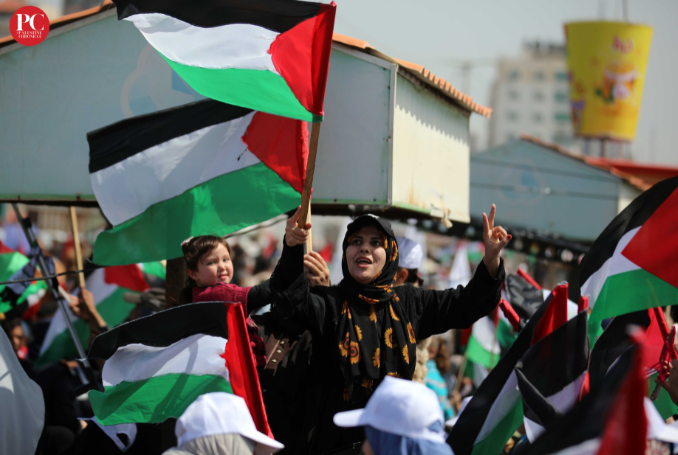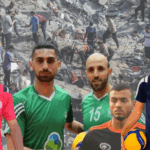Humiliation vs. Self-Respect: The Untold Story of the Abuse of Palestinian Women in Hebron

Palestinian women rally in Gaza. (Photo: Mahmoud Ajjour, The Palestine Chronicle)
By Ramzy Baroud
The humiliation of Palestinian women by Israeli soldiers in the occupied city of Al-Khalil (Hebron) on July 10 was not the first such episode. Sadly, it will not be the last.
Indeed, the stripping of five women in front of their children, parading them naked around their family home and then stealing their jewelry by an Israeli military unit, was not a random act. It deserves deep reflection.
Palestinians rightly understood the event – investigated at length by the Israeli rights group B’Tselem, in a report published on September 5 – as an intentional Israeli policy.
Several attacks carried out by Palestinians in Jericho and Jerusalem have already been linked to the call for revenge made by Palestinian groups, including women collectives.
We are expecting the Resistance “not to stand idly by in the face of this heinous (crime),” a spokesperson for a women’s group in Gaza said on September 5.
The B’Tselem investigation was damning. “Dozens of masked soldiers, with dogs” raided the ‘Ajlouni family in southern Hebron, B’Tselem said. They “handcuffed three family members”, including a minor, “separated men from women and children, and began an extensive search of them and their home”.
The humiliating episode was yet to follow, as “masked female soldiers” threatened a mother with a dog and forced her to strip completely naked in front of her children.
The degrading treatment was repeated against four other women, as they were forced to move, naked, from room to room. Other soldiers, meanwhile, were busy stealing the family’s jewelry, according to the report.
Corporate Western media ignored the investigation, although it enthusiastically reported on the retaliatory attacks on Israeli occupation soldiers by Palestinian youth in Jericho and Jerusalem, providing little or no context to what they perceived to be ‘Palestinian terrorism’.
But the Hebron women and the ‘Ajlouni family are the actual victims of terrorism – Israeli terrorism.
Though the Hebron incident is a repeat of numerous violations of Palestinian rights and dignity spanning many years, there is still much we can learn from it.
Humiliating Palestinians is an actual Israeli policy and cannot be attributed to ‘a few bad apples’ in an otherwise “most moral army in the world”.
This assertion can easily be demonstrated by a quick comparison of the behavior of Zionist militias during the Nakba (1947-48) to later episodes, and, eventually, to the recent events in Hebron.
Israeli historian Ilan Pappe’s ‘Ethnic Cleansing of Palestine’ provides illuminating, although difficult-to-read passages on the rape of Palestinian women during those horrific years.
The Israeli newspaper Haaretz reported last year that sensitive references were purposely removed from unclassified Israeli military documents concerning the events that led to the Nakba.
It quoted Aharon Zizling – the country’s first minister of agriculture – as saying that although he “can forgive instances of rape (in the Palestinian city of Ramleh) … I will not forgive other acts.”
Such callousness was entirely consistent with the violent behavior and attitude exhibited by the militias – later to form the Israeli army – and their leaders, including David Ben Gurion, who later became the first prime minister of Israel. In the document, Israel’s founding father called for the “wiping out” of Palestinian villages. This, too, was removed from the documents.
Most Israelis are unaware of this sordid past, simply because the subject is banned in school. The so-called ‘Independence Day Law’ – also known as the Nakba Law of 2009 – “outlaws any mention of the Nakba or reference to the establishment of the State of Israel as a day of mourning”, according to the legal group, Adalah.
Though Israel has succeeded in deceiving its own people regarding their collective past, the historical processes that produced such violence remain in place. This means that Israel continues to reproduce that same violence in different forms, even though every generation is largely unaware of how their behavior is a continuation of the same legacy of previous generations.
It also means that soldiers who humiliated the Palestinian women in Hebron are likely unaware of the mass violence that accompanied the Nakba; they might not even be aware of the term ‘Nakba’ itself.
Their behavior, however, is indicative of the culture of violence in Israel, the rooted racism and this persistent desire to humiliate Palestinians.
This was equally true during the First Intifada, the uprising in 1987-93. Back then, sexual violence went hand in hand with Israeli violence against the Palestinian population.
The sexual abuse of Palestinian women during the Intifada, especially in Israeli prisons, was commonplace. The Israeli military used this tactic to exact confessions or to discourage female activists and their families from pursuing the path of resistance.
All of this falls into the realm of the ‘politics of humiliation‘, a centralized political strategy that is used to establish control and dominance over occupied nations.
The Israelis have excelled in this field. We know this because of the numerous reports by Palestinians themselves, and also because of the testimonies of Israelis. This was amply demonstrated in the reports provided by the Breaking the Silence group – Israeli soldiers who either left or refused to join the Israeli military.
Many of these ‘refuseniks’, who spoke out publicly, have cited the dehumanization and degradation of Palestinians at the hands of Israeli soldiers as one of the reasons why they walked out.
All of this illustrates that such events are neither marginal nor isolated, supposedly carried out by mentally fatigued soldiers who violated army roles. The exact opposite is true.
In fact, the sexual degradation of Palestinian women is just one addition to the protracted and ongoing politics of humiliation in Occupied Palestine.
When Palestinians resist, they do so to reclaim their land, along with their basic freedom and human rights; and also to redeem their collective honor, trampled daily by the Israeli army.
Indeed, resistance in Palestine is not a mere ‘strategy’ to recover a stolen homeland. It is, in the words of Frantz Fanon, “a sense of freedom” from “despair and inaction”, and a collective act of restoration of “self-respect”.
This explains why Palestinians continue to resist, even if their resistance is often derided as ineffectual and futile and why they will continue to resist for many years to come.










































0 Comments